Facebook CEO Mark Zuckerberg faced tough questions from European Union lawmakers Tuesday over what one of them branded Zuckerberg's "digital monster," and he apologized for the way the social network has been used to produce fake news, interfere in elections and sweep up people's personal data.
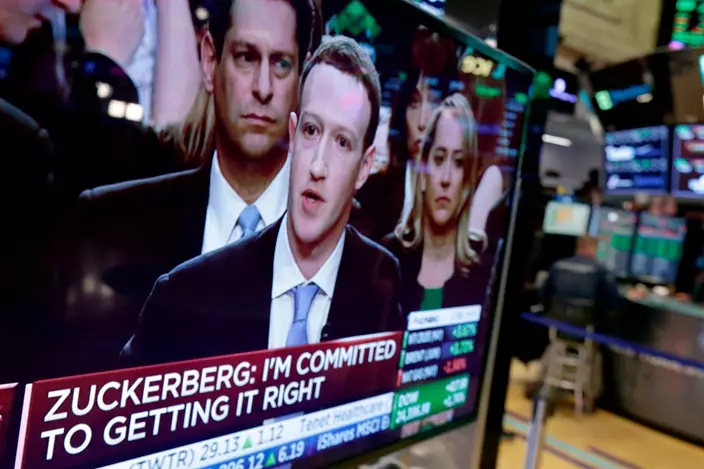
FILE - In this April 10, 2018 file photo, Facebook CEO Mark Zuckerberg appears on a television screen on the floor of the New York Stock Exchange as he testifies in the Senate in Washington. Shares in the social media giant are trading around $185 early Friday, May 11, returning to the levels last seen eight weeks ago, when news broke that the company failed to prevent major privacy breaches during the run-up to the 2016 presidential election in the U.S.
(AP Photo/Richard Drew, File)
At a hearing in the European Parliament in Brussels, legislators sought explanations about the growing number of false Facebook accounts and whether Facebook will comply with new EU privacy rules, but many were left frustrated by Zuckerberg's lack of answers.
Click to Gallery
Facebook CEO Mark Zuckerberg faced tough questions from European Union lawmakers Tuesday over what one of them branded Zuckerberg's "digital monster," and he apologized for the way the social network has been used to produce fake news, interfere in elections and sweep up people's personal data.
At a hearing in the European Parliament in Brussels, legislators sought explanations about the growing number of false Facebook accounts and whether Facebook will comply with new EU privacy rules, but many were left frustrated by Zuckerberg's lack of answers.
As a result, he was able to avoid giving some answers and ran out of time to provide others.
"That was a mistake, and I'm sorry for it," he added during the hearing, which ran just over an hour and a half.
"We are at the crossroads, and in a critical situation, because your business practices touch upon two basic values of our societies," Bullmann said. "First of all, the personal data which became perhaps the most important asset in modern media society. And secondly, on the right of self-government of sovereign nations."
After short opening remarks, Zuckerberg listened to all the questions first, and then responded to them all at once. There was no back-and-forth with lawmakers, as happened during his testimony in front of the U.S. Congress last month.
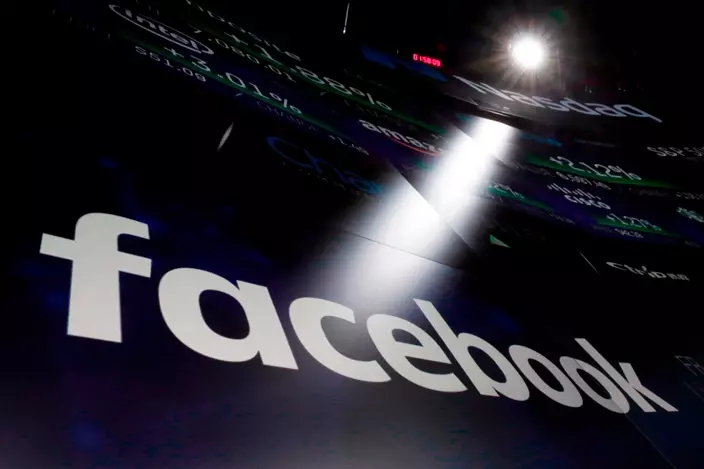
FILE- In this March 29, 2018, file photo the logo for Facebook appears on screens at the Nasdaq MarketSite in New York's Times Square. Many companies large and small are updating their privacy policies and service terms to comply with upcoming European Union rules governing data and privacy. In preparation for GDPR, Facebook in March updated its privacy controls in hopes of making them easier to find and understand. (AP Photo/Richard Drew, File)
As a result, he was able to avoid giving some answers and ran out of time to provide others.
His appearance came at a difficult time for Facebook. In March it was alleged that political consulting firm Cambridge Analytica used the data of millions of Facebook users to target voters during political campaigns, including the one that brought Donald Trump to the presidency.
Whether it was "fake news, foreign interference in elections and developers misusing people's information," Zuckerberg said, "we didn't take a broad enough view of our responsibilities."
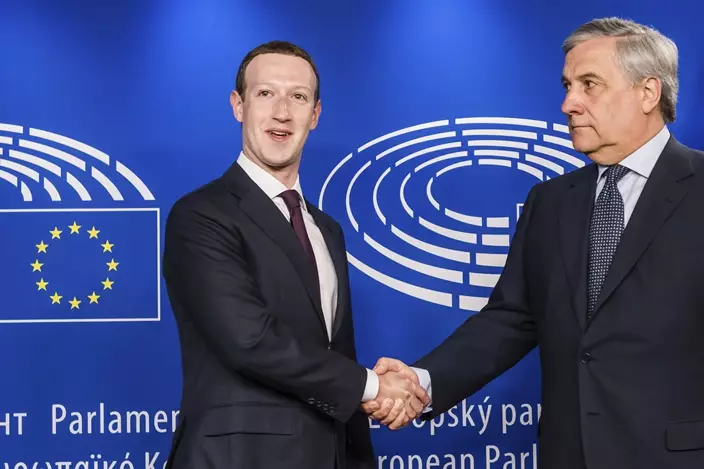
European Parliament President Antonio Tajani, right, welcomes Facebook CEO Mark Zuckerberg upon his arrival at the EU Parliament in Brussels on Tuesday, May 22, 2018. Facebook CEO Mark Zuckerberg faces senior European Union lawmakers today to answer questions about a scandal over the alleged misuse of the data of millions of Facebook users. (AP Photo/Geert Vanden Wijngaert)
"That was a mistake, and I'm sorry for it," he added during the hearing, which ran just over an hour and a half.
But liberal leader Guy Verhofstadt said Zuckerberg has done enough apologizing for his company's mistakes. He said the real question is: "Are you capable to fix it?"
Verhofstadt asked whether Zuckerberg wanted to be remembered like computer legends Bill Gates and Steve Jobs, "who have enriched our world and our societies," or as "a genius who created a digital monster that is destroying our democracies and our societies."
Socialist leader Udo Bullmann demanded an explanation for how the number of false Facebook accounts can be on the rise and what is being done to stop them being used to manipulate elections.
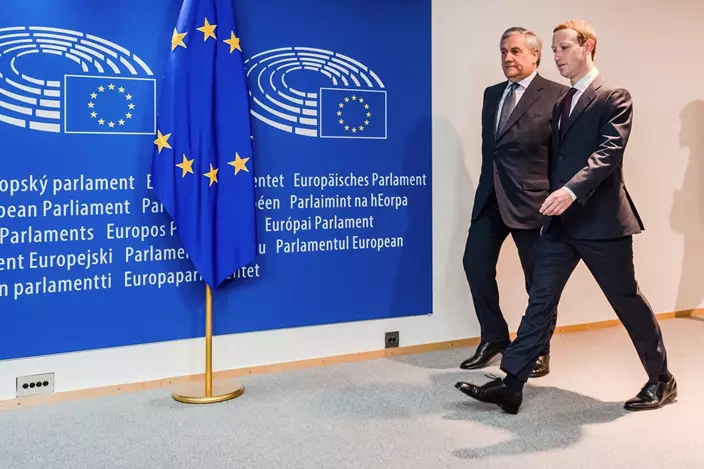
European Parliament President Antonio Tajani, background, walks with Facebook CEO Mark Zuckerberg upon his arrival at the EU Parliament in Brussels, Tuesday, May 22, 2018. (AP Photo/Geert Vanden Wijngaert)
"We are at the crossroads, and in a critical situation, because your business practices touch upon two basic values of our societies," Bullmann said. "First of all, the personal data which became perhaps the most important asset in modern media society. And secondly, on the right of self-government of sovereign nations."
Zuckerberg said Facebook is strengthening cooperation with national election authorities and trying to introduce more transparency about who is running political advertising.
"This is one of our top priorities as a company," he told the lawmakers. He said the goal is to build more artificial-intelligence tools to identify fake accounts and to take them down.
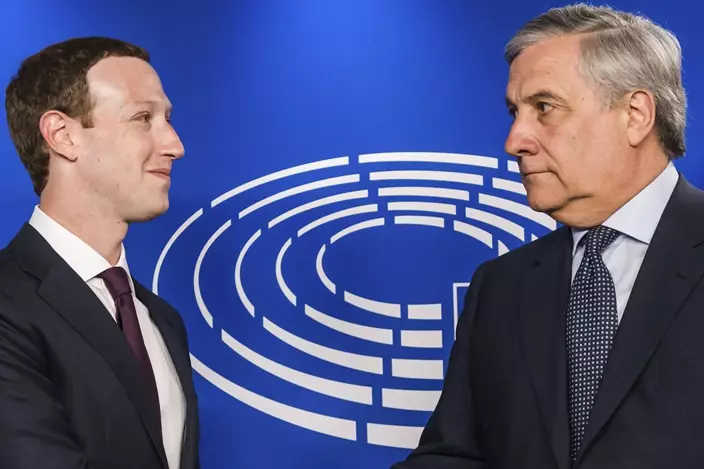
European Parliament President Antonio Tajani, right, welcomes Facebook CEO Mark Zuckerberg upon his arrival at the EU Parliament in Brussels on Tuesday, May 22, 2018. European Parliament President Antonio Tajani, right, welcomes Facebook CEO Mark Zuckerberg upon his arrival at the EU Parliament in Brussels, Tuesday, May 22, 2018. (AP Photo/Geert Vanden Wijngaert)
Facebook came away largely unscathed from Zuckerberg's testimony in front of Congress in April. The company's stock even rose after his appearance. Several U.S. lawmakers often seemed to fail to grasp the technical details of Facebook's operations.
European politicians in general have been tougher on Silicon Valley and have attached more importance to online privacy.
Zuckerberg's testimony in Brussels came just before a stringent new EU law, known as the General Data Protection Regulation, or GDPR, takes effect.
The law, which goes into force on Friday, is tougher than U.S. legislation and will give Facebook's estimated 252 million European users more control over what companies can do with what they post, search and click on, regardless of what country those companies operate in. Companies could be fined up to 4 percent of their worldwide annual revenue for violations.
Asked whether Facebook is ready to respect the rules, Zuckerberg said: "We do expect to be fully compliant" on Friday.
The evening hearing was initially meant to be held behind closed doors but was broadcast live after many in the assembly demanded an open session.
As time ran out, Zuckerberg agreed to provide written answers to questions he had not responded to during the hearing.
Lamenting the way the hearing was organized and the lack of solid answers, Conservative leader Sayed Kamall said, "Unfortunately the format was a get-out-of-jail-free card."
"We still don't know the depths that people's data has been abused," he said. "Until we genuinely know what has happened, and is still happening, Facebook and legislators can't put in place the right solutions to prevent the same issues in the future."
Zuckerberg is due to hold talks in Paris on Wednesday with French President Emmanuel Macron.
In his final letter to his wife before he vanished on Mount Everest a century ago, George Mallory tried to ease her worries even as he said his chances of reaching the world's highest peak were “50 to 1 against us."
The letter, digitized for the first time and published online Monday by his Cambridge University alma mater, expressed a mix of optimism, exhaustion and the difficulties his expedition encountered on their quest to be the first party to conquer the peak.
“Darling I wish you the best I can — that your anxiety will be at an end before you get this — with the best news," he wrote to Ruth Mallory on May 27, 1924 from Camp I. “It is 50 to 1 against us but we’ll have a whack yet & do ourselves proud.”
It remains a mystery whether Mallory, who once famously said he wanted to conquer Everest “because it’s there,” and climbing partner Andrew Irvine reached the summit and died on the way down or never made it that far. Mallory’s body was found 75 years later far below the peak, but Irvine's has never been located.
The first documented ascent came nearly three decades later when New Zealander Edmund Hillary and Nepalese Sherpa Tenzing Norgay scaled the mountain on May 29, 1953.
Magdalene College posted the letters online to mark the centenary of Mallory's ill-fated attempt to stand atop the world. The collection, which had previously been available to researchers, also includes letters he wrote from the battlefront in World War I and correspondence he received from others, including his wife.
The only surviving letter his wife wrote from England during the expedition was sent as his party sailed toward Bombay. It recounts a recent snowstorm, how her bank account was overdrawn and how she fell off a ladder before telling him how much she missed him.
“I know I have rather often been cross and not nice and I am very sorry but the bottom reason has nearly always been because I was unhappy at getting so little of you," Ruth Mallory wrote on March 3, 1924. “I know it is pretty stupid to spoil the times I do have you for those when I don’t.”
In his final six-page correspondence to his wife, addressed to “My dearest Ruth," George Mallory speaks of trials and triumphs as the party slowly made its way up the mountain, setting up higher camps and then retreating to lower elevation to recover.
“This has been a bad time altogether,” Mallory wrote 12 days before he was last seen alive. “I look back on tremendous efforts & exhaustion & dismal looking out of a tent door and onto a world of snow & vanishing hopes — & yet, & yet, & yet there have been a good many things to set on the other side.”
Mallory said he had a nagging cough “fit to tear one’s guts” that left him sleepless and made climbing difficult. He described a near-death plunge into a crevasse when he failed to detect it beneath a blanket of snow.
“In I went with the snow tumbling all around me, down luckily only about 10 feet before I fetched up half-blind & breathless to find myself most precariously supported only by my ice ax somehow caught across the crevasse & still held in my right hand,” he said. “Below was a very unpleasant black hole.”
Mallory said only one member of the party remained “plum fit” and they planned to rest up for two days before pushing for the summit, which was expected to take six days.
Mallory and Irvine were last seen alive June 8, 1924 when they were said to be still going strong some 900 feet (274 meters) beneath the 29,035 feet (8,850 meters) summit. Mallory’s body was found at 26,700 feet (8,138 meters).
A group of mountaineers who tried in 2007 to reconstruct Mallory's ascent were unable to determine if the pair made it to the top.
“I still believe the possibility is there they made it to the top, but it is very unlikely,” said Conrad Anker, who participated in a documentary recreating the climb and who had discovered Mallory's body in 1999.
In Mallory's final letter to his wife, he says, “the candle is burning out & I must stop.” He signs off: “Great love to you. Ever your loving, George.”
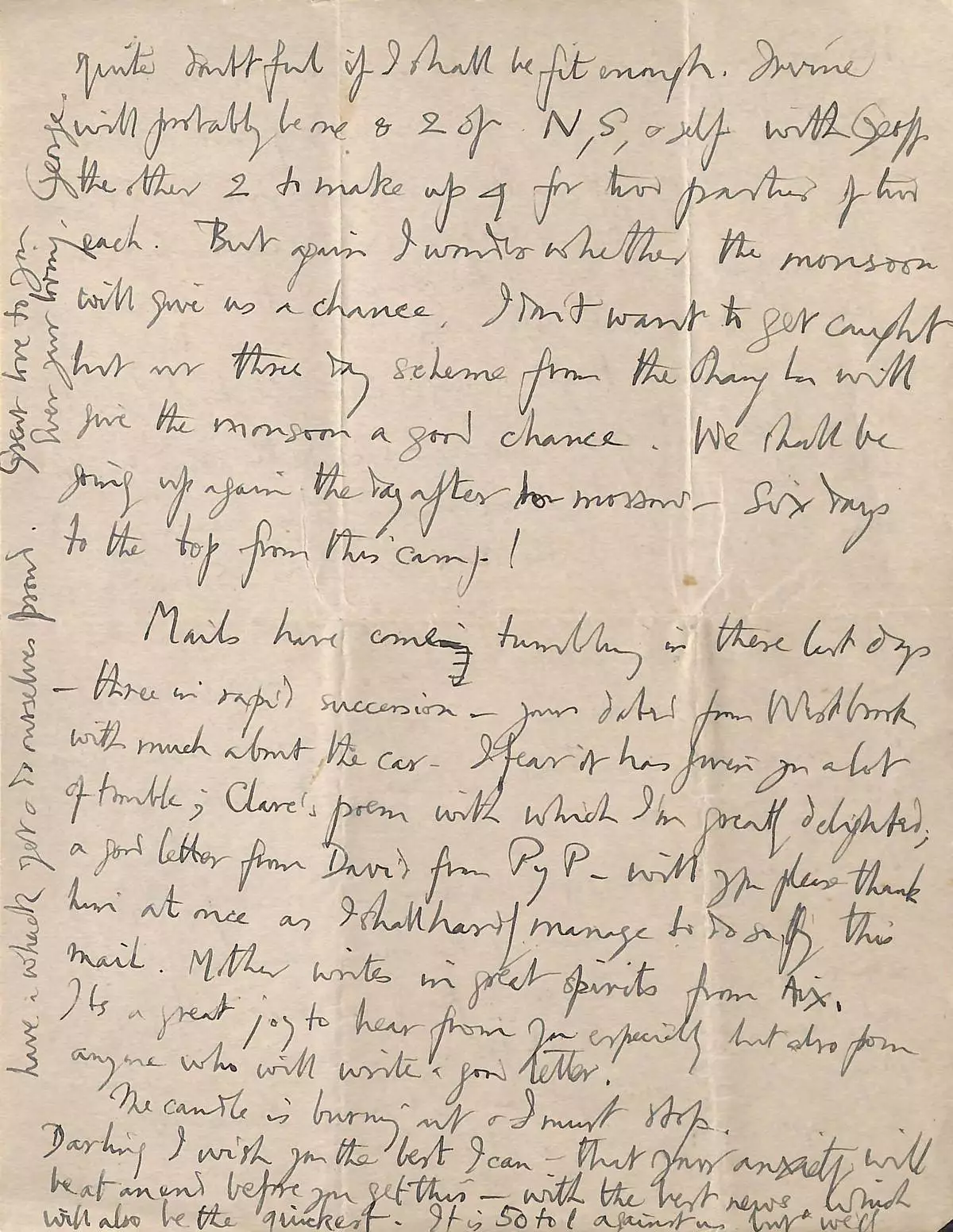
This is an undated photo provided by Magdalene College Cambridge on Monday, April 22, 2024 of part of the final letter that mountaineer George Mallory wrote to his wife before he vanished on Mount Everest a century ago. The letter has been digitalized. The letter was published on Monday by Mallory's Cambridge University college. In it, he tried to ease her worries though he said his chances of reaching the world’s highest peak were “50 to 1 against us.” (Reproduced with Permission of the Master and Fellows of Magdalene College, Cambridge via AP)
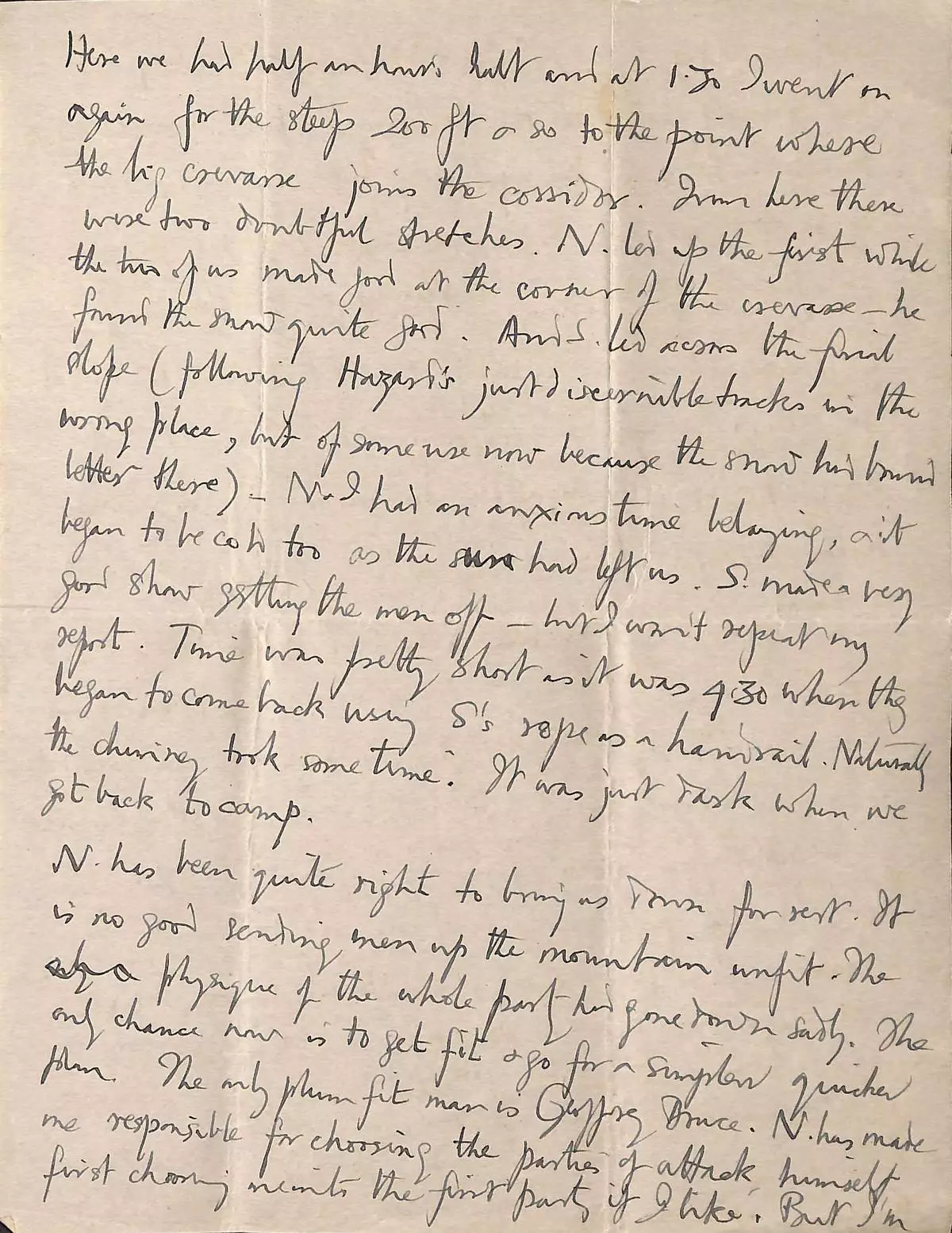
This is an undated photo provided by Magdalene College Cambridge on Monday, April 22, 2024 of part of the final letter that mountaineer George Mallory wrote to his wife before he vanished on Mount Everest a century ago. The letter has been digitalized. The letter was published on Monday by Mallory's Cambridge University college. In it, he tried to ease her worries though he said his chances of reaching the world’s highest peak were “50 to 1 against us.” (Reproduced with Permission of the Master and Fellows of Magdalene College, Cambridge via AP)
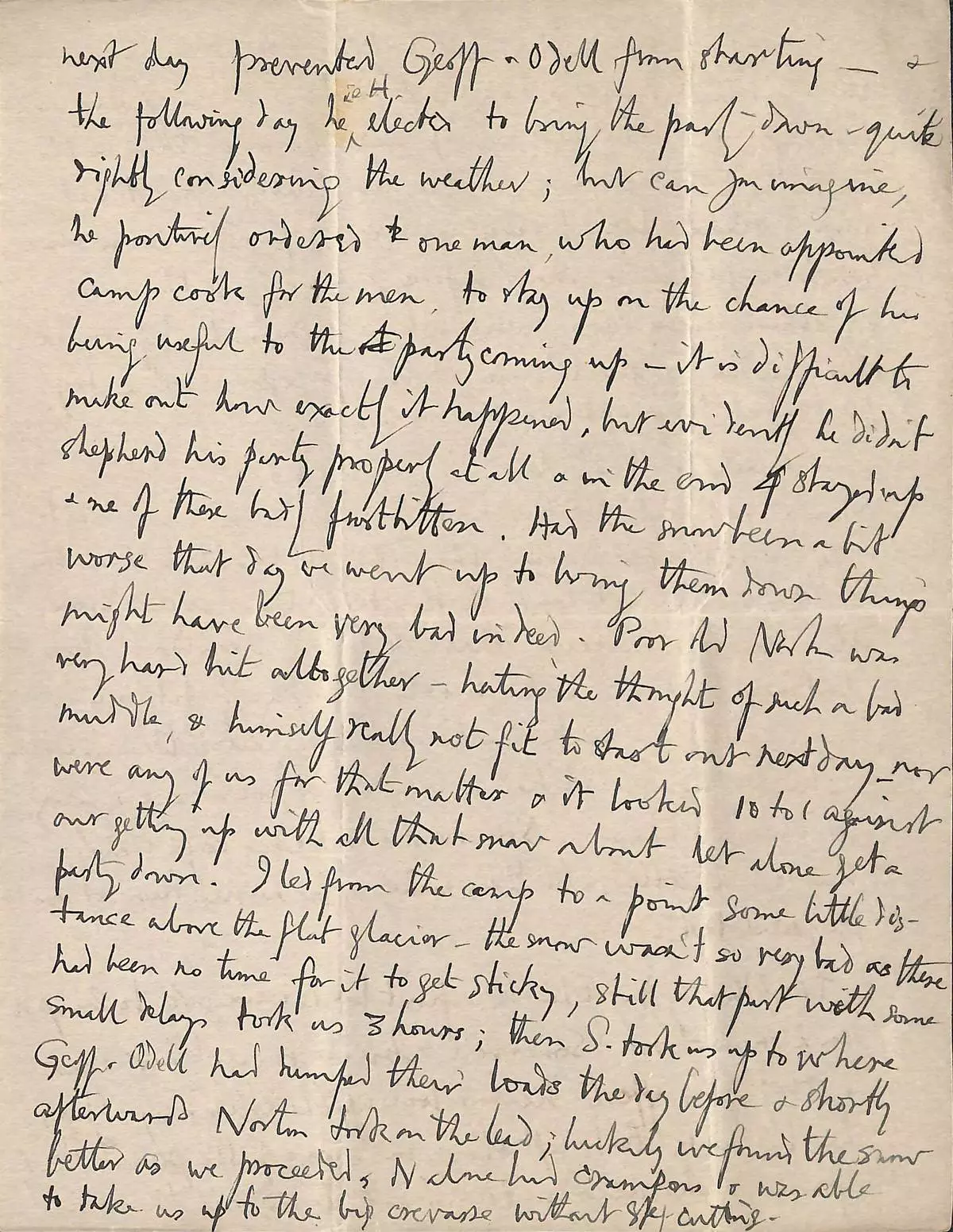
This is an undated photo provided by Magdalene College Cambridge on Monday, April 22, 2024 of part of the final letter that mountaineer George Mallory wrote to his wife before he vanished on Mount Everest a century ago. The letter has been digitalized. The letter was published on Monday by Mallory's Cambridge University college. In it, he tried to ease her worries though he said his chances of reaching the world’s highest peak were “50 to 1 against us.” (Reproduced with Permission of the Master and Fellows of Magdalene College, Cambridge via AP)
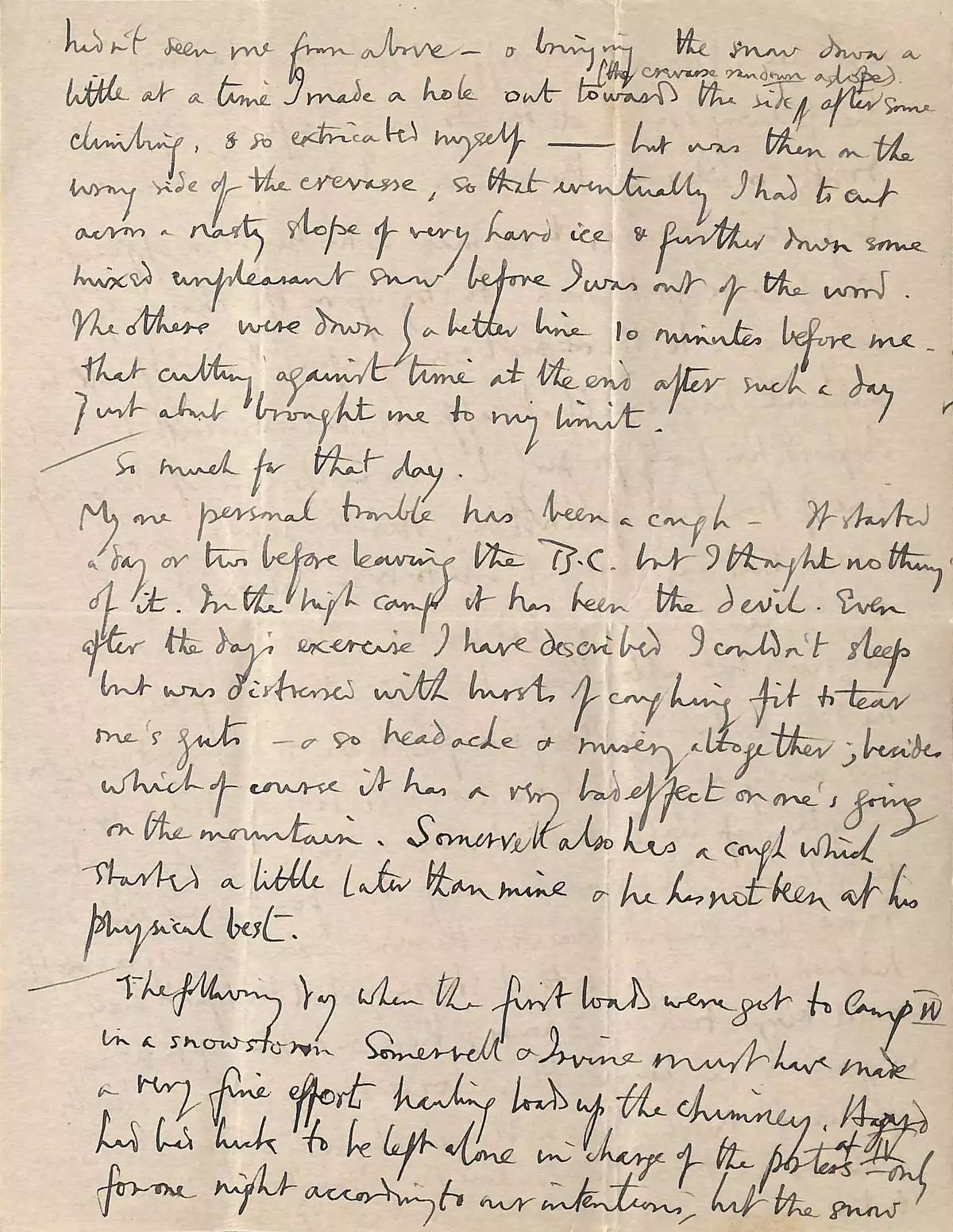
This is an undated photo provided by Magdalene College Cambridge on Monday, April 22, 2024 of part of the final letter that mountaineer George Mallory wrote to his wife before he vanished on Mount Everest a century ago. The letter has been digitalized. The letter was published on Monday by Mallory's Cambridge University college. In it, he tried to ease her worries though he said his chances of reaching the world’s highest peak were “50 to 1 against us.” (Reproduced with Permission of the Master and Fellows of Magdalene College, Cambridge via AP)
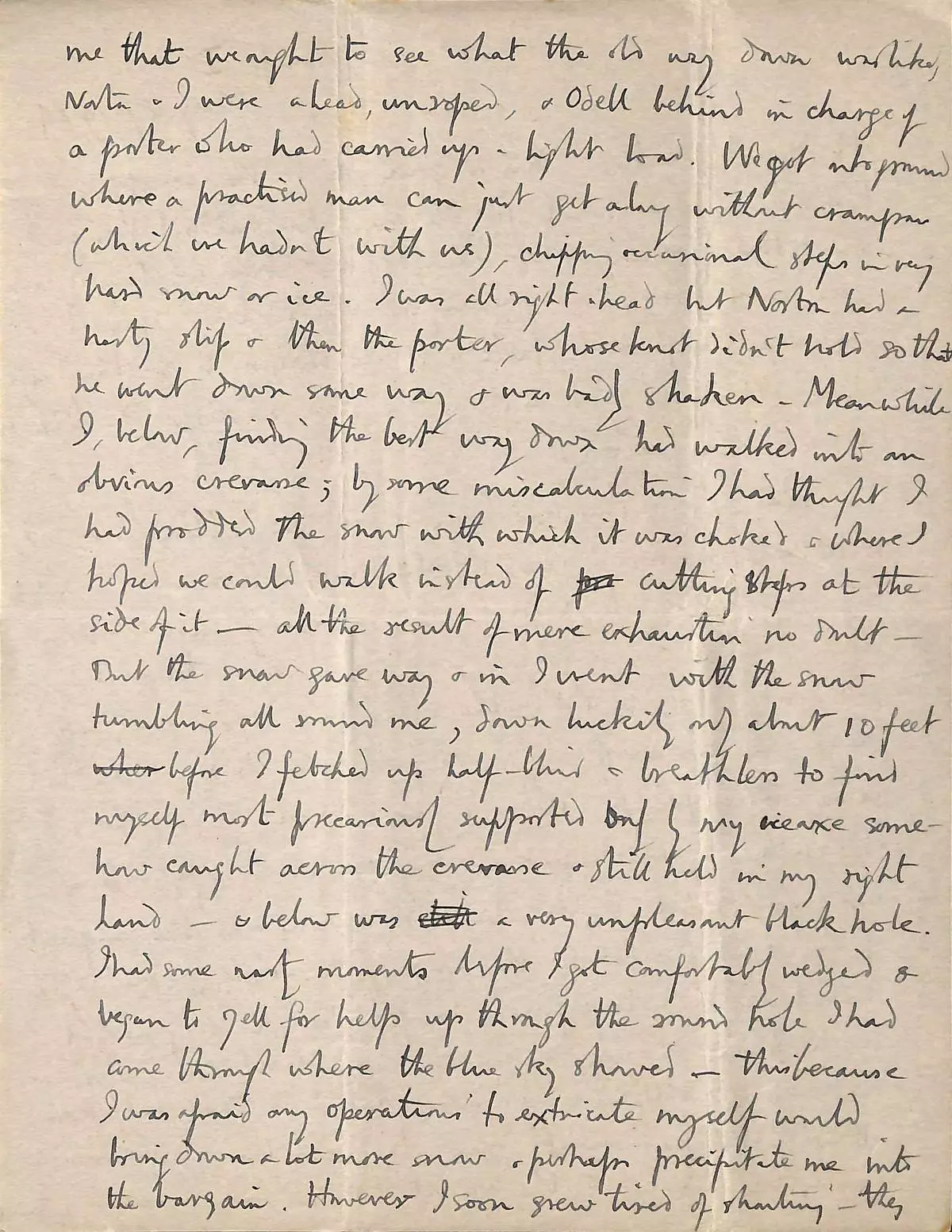
This is an undated photo provided by Magdalene College Cambridge on Monday, April 22, 2024 of part of the final letter that mountaineer George Mallory wrote to his wife before he vanished on Mount Everest a century ago. The letter has been digitalized. The letter was published on Monday by Mallory's Cambridge University college. In it, he tried to ease her worries though he said his chances of reaching the world’s highest peak were “50 to 1 against us.” (Reproduced with Permission of the Master and Fellows of Magdalene College, Cambridge via AP)
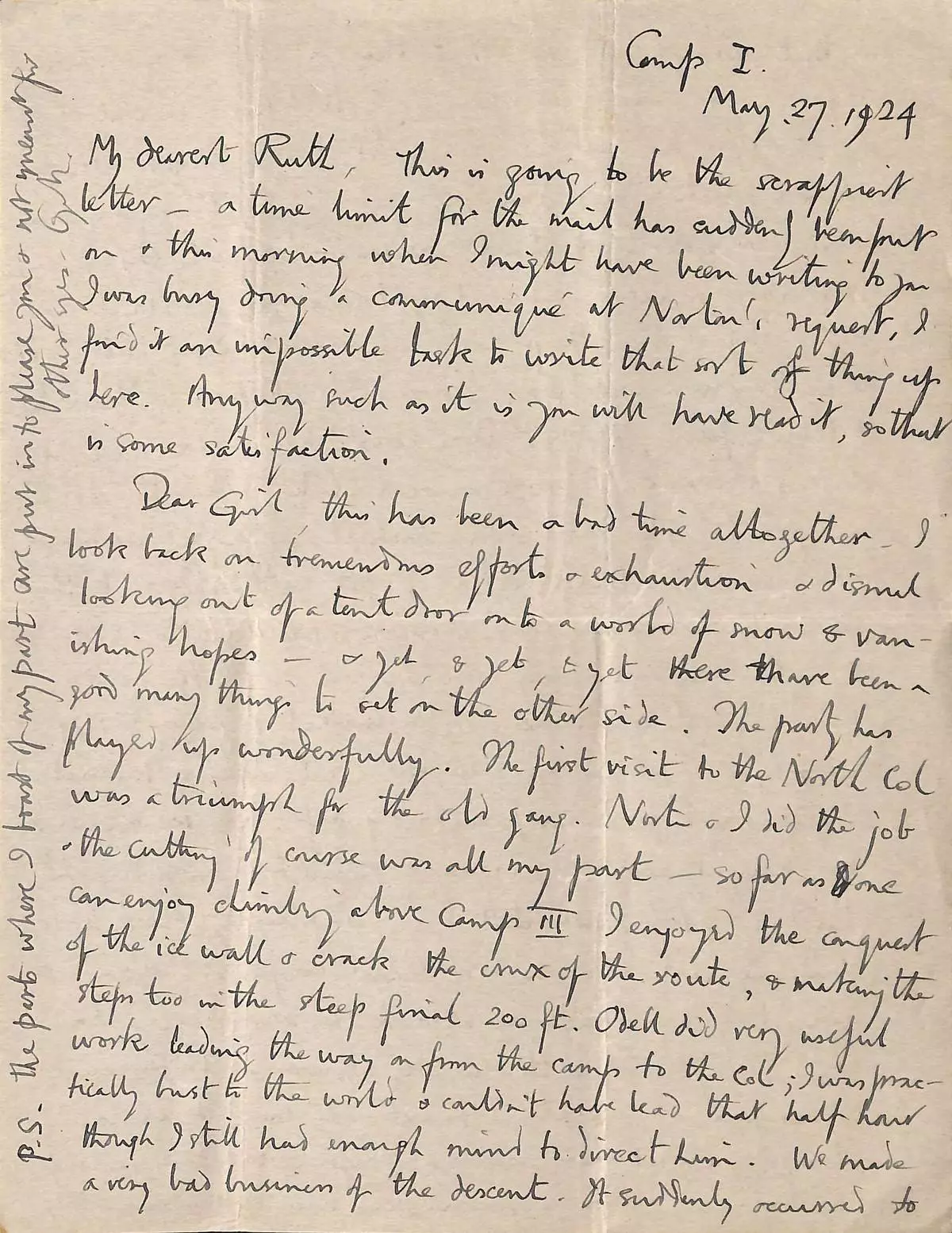
This is an undated photo provided by Magdalene College Cambridge on Monday, April 22, 2024 of part of the final letter that mountaineer George Mallory wrote to his wife before he vanished on Mount Everest a century ago. The letter has been digitalized. The letter was published on Monday by Mallory's Cambridge University college. In it, he tried to ease her worries though he said his chances of reaching the world’s highest peak were “50 to 1 against us.” (Reproduced with Permission of the Master and Fellows of Magdalene College, Cambridge via AP)
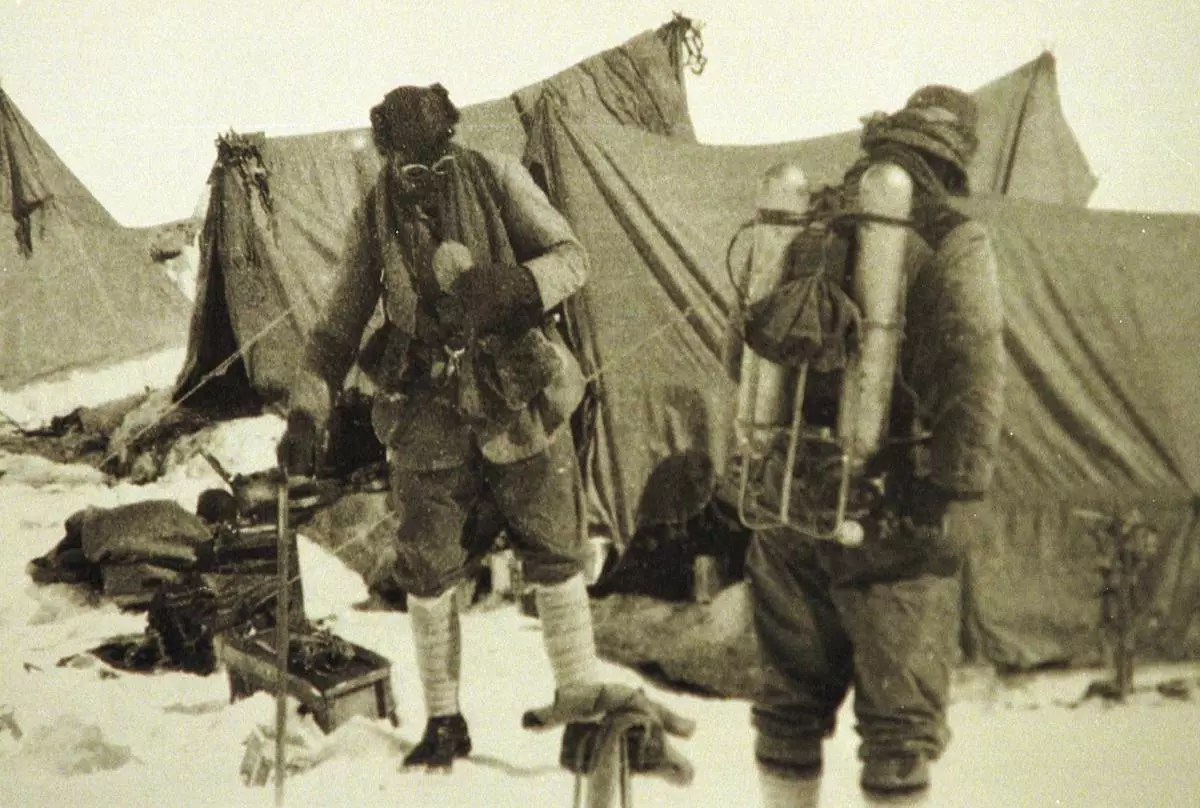
FILE - British mountaineers George Mallory is seen with Andrew Irvine at the base camp in Nepal, both members of the Mount Everest expeditions 1922 and 1924, as they get ready to climb the peak of Mount Everest June 1924. It is the last image of the men before they disappeared in the mountain. George Mallory’s final letter to his wife before he vanished on Mount Everest a century ago tried to ease her worries though he said his chances of reaching the world’s highest peak were “50 to 1 against us.” (AP Photo, File)





















